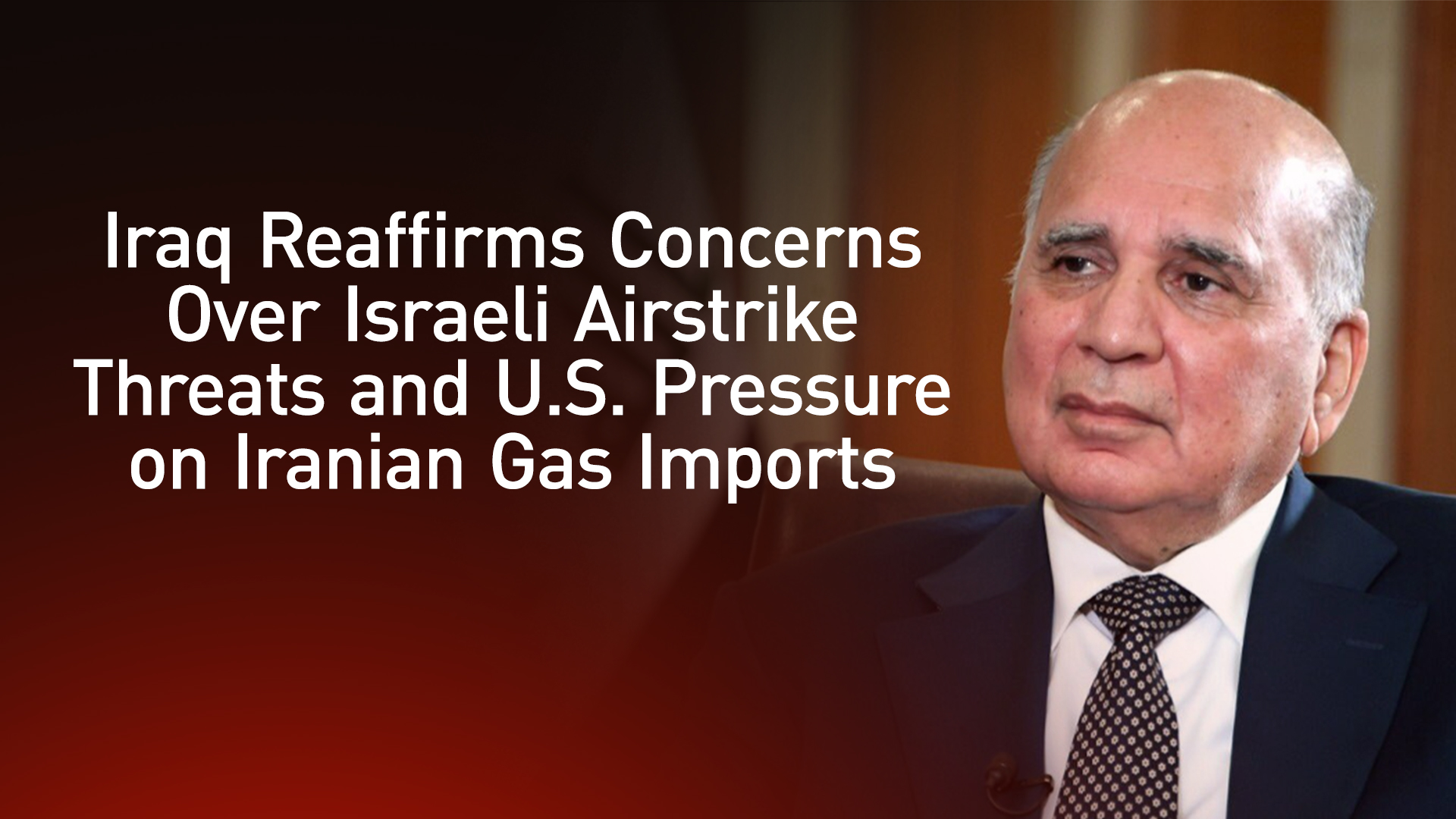Iraq Reaffirms Concerns Over Israeli Airstrike Threats and U.S. Pressure on Iranian Gas Imports
Iraqi FM Fuad Hussein Warns of Ongoing Israeli Airstrike Threat, Reveals U.S. Request to Halt Iranian Gas Imports, and Warns of the Shifting Regional Dynamics.

ERBIL (Kurdistan24) – Iraqi Foreign Minister Fuad Hussein has reiterated that "the threat of Israeli airstrikes on Iraq remains in place." He also revealed that "the United States has requested Iraq to halt imports of Iranian gas." Addressing the ongoing regional developments, Hussein stated that "the dynamics of the region are shifting."
In an exclusive interview on Thursday, with Al Arabiya, Hussein, who also serves as Iraq’s Deputy Prime Minister, discussed Baghdad’s relations with Washington, militant attacks on coalition forces, the renewed peace process in Turkey, the Gaza war, and other critical matters.
Militant Attacks and Israeli Airstrike Threats
Since the outbreak of the Gaza war on October 7, 2023, Iran-backed militant groups in Iraq have launched missile attacks against Israel in support of Hamas. Simultaneously, these groups have targeted coalition military bases in Iraq and the Kurdistan Region.
Hussein linked the ongoing rocket attacks by Iraqi armed factions to "the changing dynamics in the region" and stressed the need to "shield Iraq from regional conflicts and avoid entanglement in any war."
Israel, through U.S. intermediaries, has repeatedly warned Iraqi officials that if these attacks continue, it may conduct retaliatory airstrikes on Iraqi territory. When asked about the possibility of Israeli airstrikes, Hussein confirmed that "the threats of Israeli airstrikes on Iraq remain." He also disclosed that "the United States has repeatedly sent indirect messages regarding the activities of these militant groups."
Moreover, Hussein emphasized that "these groups must not pose a threat to the presence of coalition forces in Iraq," adding that "so far, there has been no change in the timeline for the withdrawal of U.S. and allied forces from Iraq."
U.S. Pressure on Iranian Gas Imports
In another major development, Hussein addressed U.S. policy toward Iraq’s energy sector. He stated that "the United States has asked Iraq to halt its imports of Iranian gas and has presented several proposals aimed at increasing pressure on Tehran."
Despite this, the foreign minister underscored Iraq’s commitment to maintaining a balanced approach in its diplomatic engagements with both the U.S. and Iran, affirming that "Iraq seeks to maintain stability in its relationships with both nations and is keen on continuing strategic dialogues with Washington."
Regarding U.S. sanctions on Iraqi financial institutions, Hussein assured that "there are no new American sanctions imposed on Iraqi banks."
Iraq-Syria Relations Amid Regional Tensions
Last week, Syrian Foreign Minister Faisal Mekdad was scheduled to visit Baghdad for the first time since the fall of the Assad regime. However, as Hussein confirmed, the visit was postponed at Syria’s request.
Dispelling speculation about security concerns behind the delay, Hussein clarified, "Syria did not request security guarantees for the visit." He further asserted that "Iraq’s position on Syria’s developments is independent of any influence from Iran."
Renewed Peace Process in Turkey
Separately, the foreign minister commented on the resumption of peace talks in Turkey. On Thursday, a delegation from the Peoples’ Equality and Democracy Party (DEM Party) is expected to visit Imrali Island Prison to meet with Abdullah Ocalan, the imprisoned leader of the Kurdistan Workers’ Party (PKK), recognized as a terrorist organization by Turkey, EU, and the United States, in a bid to discuss a new peace initiative.
According to a DEM Party statement, following the meeting, a seven-member delegation will hold a press conference at 5:00 PM on Thursday to disclose the details of the discussions and Ocalan’s stance on the renewed peace process.
Hussein acknowledged the significance of the initiative and pointed out that "the renewed peace process in Turkey, along with PKK disarmament, could lead to producing a new regional equation."
Iraq's Struggle for Stability: Militias, Iranian Influence, and Regional Dynamics
The current situation in Iraq has been deeply influenced by multiple factors, including the failure of Iraq’s government to effectively control armed militias, many of which have been involved in hostile actions against U.S. interests in the region.
This lack of control over non-state actors has not only destabilized the country but has also complicated its relations with regional powers, particularly the U.S. Despite efforts to manage internal security, Iraq has struggled to maintain a strong, independent stance, with some factions continuing to carry out attacks on American and Israeli targets, further escalating tensions.
Additionally, Iraq’s inability to reduce Iran’s influence within its borders remains a critical issue. Iraq continues to rely on Iranian energy imports, including electricity and natural gas, which not only strains its economy but also contributes financially to Iran, reinforcing its leverage over Iraq.
This dependency has hindered Iraq's ability to secure energy independence and create more sustainable domestic energy policies, thus weakening its national sovereignty and complicating regional dynamics.
These challenges have made it increasingly difficult for Iraq to stabilize the region, with Iraq’s lack of self-reliance exacerbating the complexity of the situation and leaving it vulnerable to external influence.
